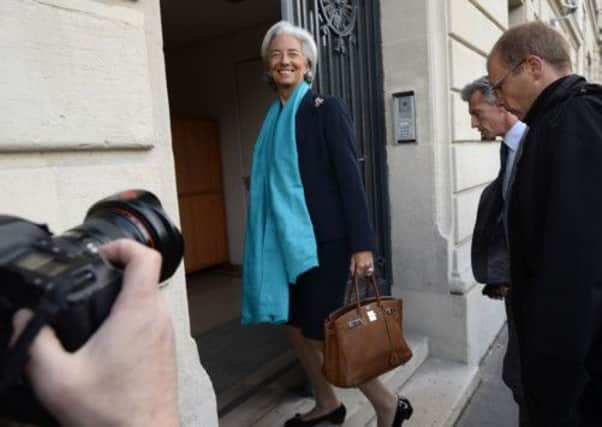Christine Lagarde £250m Sarkozy payout court date


Ms Lagarde risks being placed under formal investigation at the hearing before French magistrates for her 2007 decision as Mr Sarkozy’s finance minister to use arbitration to settle a court battle between the state and businessman Bernard Tapie.
This would mean there was “serious or consistent evidence” of probable implication in a crime and takes Ms Lagarde one step closer to full trial. Many investigations never get that far.
Advertisement
Hide AdAdvertisement
Hide AdThe process could prove uncomfortable for the IMF, whose former head, Frenchman Dominique Strauss-Kahn, quit in 2011 over a sex assault scandal. In Washington, the IMF reaffirmed its confidence in Ms Lagarde.
“The board has been briefed on the matter a few times, including recently, and continues to express its confidence in the managing director’s ability to effectively carry out her duties,” IMF spokesman Gerry Rice said.
In Paris yesterday, Ms Lagarde smiled at reporters as she arrived at court with her lawyer and said: “It’s a pleasure to see you.”
The decision on whether to place her under investigation or give her “supervised witness” status will be announced at the end of the hearing, which could last days. The case goes back to 1993 when Mr Tapie, a controversial character in the French business and sports world, sued the state for compensation after selling his stake in sports company Adidas to then state-owned bank Credit Lyonnais.
Also a one-time Socialist minister who later supported the conservative Mr Sarkozy, Mr Tapie said the bank defrauded him after it resold the stake for a much higher sum. Credit Lyonnais, now part of Credit Agricole, denies wrongdoing.
Ms Lagarde is not accused of profiting personally and has denied doing anything wrong by opting for an arbitration process that enriched Mr Tapie. With interest, the award amounted to €403m.
However, a court specialising in cases involving ministers is targeting her for complicity in the misuse of funds because she overruled advisers to get a deal.
Her lawyer, Yves Repiquet, said Ms Lagarde had merely approved the use of an arbitration procedure decided by the state-owned holding company, Consortium de Realisation, set up to take over the debts and liabilities of Credit Lyonnais in the early 1990s.
Advertisement
Hide AdAdvertisement
Hide AdSources close to the IMF have said it is confident Ms Lagarde did not profit from the deal. But they added the board might review its position if judicial procedures kept her from work.
French government spokeswoman Najat Vallaud-Belkacem said: “Knowing the IMF and the way these institutions work, I would tend to think that if she were placed under investigation she would probably be asked to step down.”
Mr Tapie said yesterday he was “delighted” the affair was being investigated. While earlier probes had found his settlement to be perfectly legal, further examination would show how justified he had been in seeking compensation, he said.
“If there had been anything untoward in the arbitration it would have come out a long time ago,” he told Europe 1 radio, adding: “None of these legal cases are to see if I am dishonest, they are to find out how much I was robbed of.”
Practical turn
Christine Lagarde has made her mark at the IMFby taking a firm yet pragmatic stance in the austerity-versus-growth debate raging as Europe struggles to pull itself out of a long crisis.
Appointed in part for the negotiating skills she used in brokering Europe’s response to the 2008-9 global financial crisis, she has shown firmness at the IMF in insisting on the need for nations to stick to budgetary rigour when possible.
She has offered no radical new ideas, but has given candid and practical guidance to sickly countries as the IMF has reassessed the best mix of austerity and growth policies, rather than preaching one-size-fits-all solutions from the pulpit.